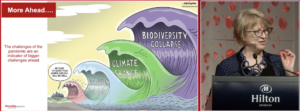The 2022 Creating Futures summit, the 7th in the series, was a bold foray into the future of education and teacher education, in a post-pandemic world. This year’s theme provoked educators to move away from the conservative and pervasive narrative of “back to normal.”
Instead, provided an opportunity to imagine and re-imagine how pandemic related lessons might inspire a reinvented future. A future founded on central pillars of relationality, reciprocity and respect.
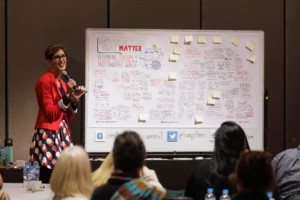
Illustration with Sue Pillans
Featuring 29 speakers including 17 five-minute provocations, and over 500 participants (in hybrid format) representing 11 different countries and more than 100 organisations nationally, the Summit was structured around three themes.
See it as it as | See it better than it is | Make it the way you see it
The moving acknowledgement to country by Waveney Yasso set the mood for the day. A day where aspirations and inspirations coalesced, with the goal of cultivating mindsets to create better futures.
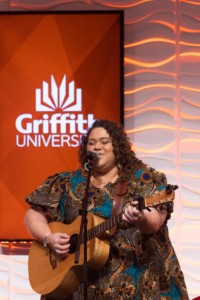
Waveney Yasso
Professor Donna Pendergast commenced proceedings with the advice to “never waste a crisis.” Meaning, we do not forget what we have learned, and, what we have learned we need to learn more about. She urged us to engage in Innovative Disruption to create new ways of doing things and to catalyse the shift from our present liminal space.
Dr Tony Breslin from the UK Policy Watch spoke to the diversity of experiences felt, seen and suffered during lockdowns.
He observes:
“rather than creating our issues, pandemic related disruptions have exposed them. We should be exploring how we re-school society post pandemic.”
Professor Ingrid Burkett spoke of the waves COVID has signalled. She says these are but a sign of things to come.
“Learning is our fundamental skill set in adapting to these waves.”
Whats to come: Professor Ingrid Burkett (Images Mackay Cartoons)
Themes of wellness and wellbeing were woven throughout the Summit. Professor Burkett connected wellness to meaningful purpose, a place in the world, resilience, optimism, and community outlook.
Megan Binnie (from the Department of Education Queensland) also foregrounded wellbeing. She asked educators to practice what they preach, fill their own cup and make staff wellbeing a top priority. This in turn, enables educators to give back to their students and to the world.
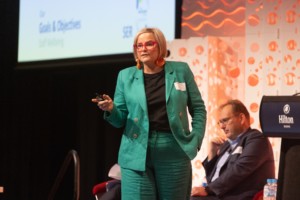
Megan Binnie
In creating new futures, mindset is key. Professor Burkett asked the gathering to ponder what “a curious mindset” can offer to a world of problems and challenges.
Raya Bidshari from the School of Humanity proposed a radical new model of education. No exams, no report cards, subjects, grades or teachers. Just competency based, inter-disciplinary, curiosity led progressive online learning spaces.
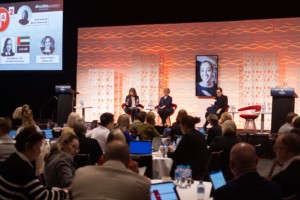
Sarah Kanowski, Prof Ingrid Burkett, Raya Bidshahri (on screen), Deanne Fishburn
In overhauling regulations, Ms Bidshari proposed reimagining teachers as “mentors, facilitators, and learning designers.” To do this, industry mentors and practitioners might also receive some training in teaching. She is and continues to be quoted across social media.
The pandemic has cemented the role of online learning in educational futures. This is a space where much potential for change lies.
Dr Deniese Cox from Teachingonline.com.au provided reasons for celebrating and surmounting silence in online learning. She explained the myriad of reasons for students’ needs for online invisibility and reminded educators that mistakes are in fact, ok.
The passion of the speakers and pace of the program were as invigorating as the different ways of excellence proposed. The use of Chime Live as on online platform allowed online participants ample opportunities to engage through answering Think Tank panel questions, completing interactive polls, posting live time photos and contributing to a live Twitter stream.
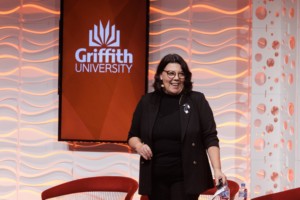
Dr Mia O’Brien
Co-convenor Dr Mia O’Brien, in her closing remarks, reminded the delegation that above all teaching is a human profession, where relationship and connection matters. “If your students are weary or anxious or stressed, they don’t want to learn anything until you help them to feel better.“
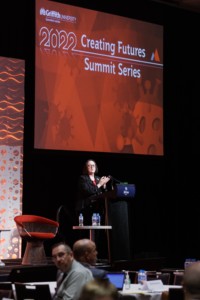
Professor Donna Pendergast
In her closing summation, Professor Donna Pendergast encouraged participants to activate their thinking. “I hope you feel powerful, enthusiastic and ready to change the world. Because that’s what we’re going to do.”
It is in taking the time to educate people about education, we can reimagine a new world.

